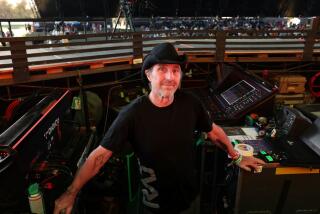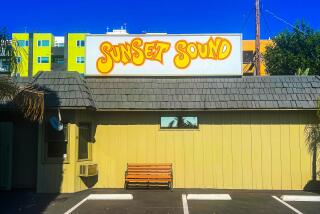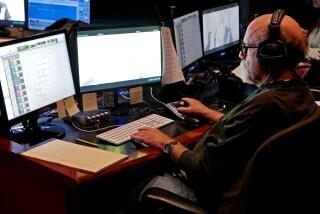Former Roadie Follows New Trails : Music: Fred Curdts toured with the Nitty Gritty Dirt Band before his sound company put down roots. Now it builds systems for major arenas and concert halls.
COLUMBIA, Md. — It’s hard to picture middle-aged, clean-cut Fred Curdts as a roadie for the Nitty Gritty Dirt Band.
But there he was, riding the soundboard, touring the country, listening to “Mr. Bojangles” for the umpteenth time.
Orleans, Livingston Taylor, Jonathan Edwards and others used Curdts’ equipment. But the former musician eventually gave up his touring sound company for a more stable life at a Baltimore audio company. Then he and two co-workers struck out on their own.
The result was Signal Perfection Ltd., which in 2 1/2 years in business has installed sound systems at the new Boston Garden, the Grand Ole Opry and a variety of other arenas and concert halls.
Curdts, 41, put aside a budding rock music career to go into the sound business. In the early 1970s, his band Morningstar, for which he played guitar, was starting to become successful.
“Fred has actually cut a couple of albums. (Billboard magazine) said his band was going to take over from Crosby, Stills & Nash. Obviously, it didn’t happen,” said partner and co-founder Chad Gillenwater.
After giving up the band, Curdts spent several years as a roadie during what he called “a wonderful time, the post-Woodstock area. Festivals were popping up all over the place.”
The quiet Penn State civil engineering graduate now handles the electronic engineering side of his company. Gillenwater handles the financial side while a third co-founder, William Parry, concentrates on marketing.
Despite the high-tech nature of the job, most of the company’s employees got into the business through their love of music and show biz, Curdts said.
“I had been into music and then into studios and then into designing and building traveling sound systems. That’s how Will and I got into the business of touring sound systems,” Curdts said.
Curdts and Parry met at Maryland Sound Industries, where they worked after selling their separate touring sound businesses. The pair met Gillenwater after Maryland Sound formed an audio installation division. The three left to form their own company in January, 1992.
Curdts’ life is now more mainstream than it was 20 years ago. He lives in Silver Spring with his wife, Leigh, and their year-old son, Evan. However, he is often still sent on a moment’s notice across the country to trouble-shoot audio problems threatening to cancel the show at an arena or stadium.
The privately held Signal Perfection expects to complete $8 million in projects this year. Gillenwater said the company expects to level off at the $10-million range and retain earnings for several years to finance future growth.
Gillenwater estimates the company is in the top 20% of audio firms nationwide and the largest company specializing in high-performance installations in arenas, concert halls and similar venues.
“They certainly are not the biggest, but that in itself is not a liability. They do extremely professional work that is on the cutting edge of the audio industry,” said James Beattie, general sales manager at Crown International Inc. in Elkhart, Ind. His company produces amplifiers and microphones used by Signal Perfection.
“They pay a lot of attention to detail. They are looking at long-term excellence in design,” Beattie said.
Signal Perfection’s reputation persuaded the Boston Symphony Orchestra to use the company to install a new audio system at its Tanglewood Hall, and symphony officials are pleased with the results, spokesman Bob Gleason said.
“Their craftsmanship of installation and wiring sets an industry standard,” he said. “In short, if they are not the leader in the industry, I do not know who is.”
However, maintaining that lead will not be easy, according to one industry watcher.
The audio-visual equipment and installation business is growing, but changing quickly as video, audio and computer technologies merge, said Dick Larson, editor of the Communications Industry Report, a magazine produced by the International Communications Industries Assn. in Fairfax, Va.
“In communications, everything is coming together. They’re all merging into one industry, so there’s a demand for companies that can come with a communications system and tell a customer how their system will work with all of these other systems,” he said.
Curdts was among the first to begin using computers to control the amplifiers driving the large speakers often seen hanging in clusters from the roofs of arenas, Beattie said.
Controlling the amplifier with a computer allows placing it closer to the speaker, shortening the amount of speaker wire needed and cutting resistance, which produces a cleaner signal, Curdts said.
“We were the first ones to do it, and now we’re kind of growing with the trend,” Curdts said.
The changes in the industry also mean that stadiums and other large projects that take several years to complete often need their audio system plans changed as new technology makes older equipment obsolete.
However, for someone who started lugging soundboards, and plugging analog amplifiers and equalizers together, the computerized digital future doesn’t worry Curdts.
“We all read science fiction, so of course we expected it,” he said.
More to Read
The biggest entertainment stories
Get our big stories about Hollywood, film, television, music, arts, culture and more right in your inbox as soon as they publish.
You may occasionally receive promotional content from the Los Angeles Times.










